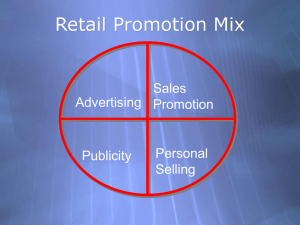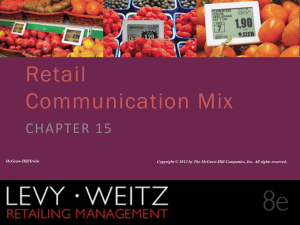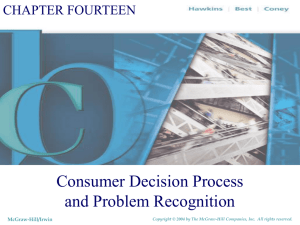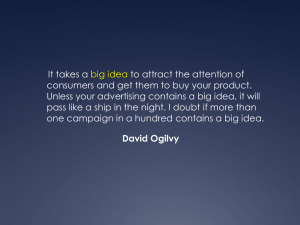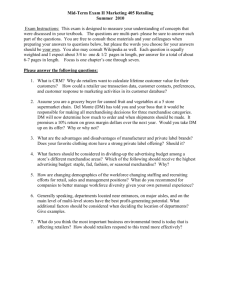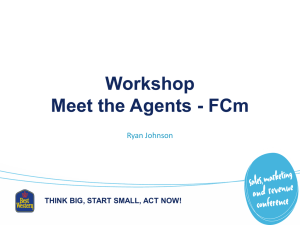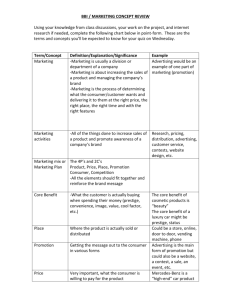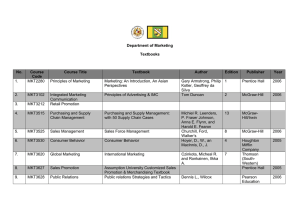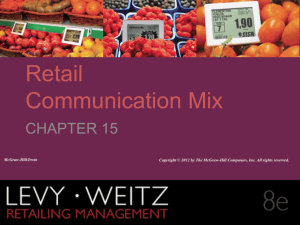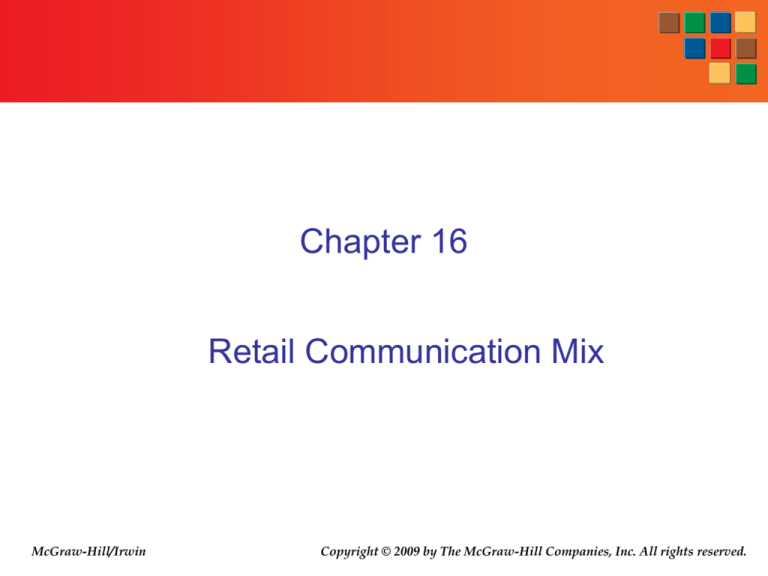
Chapter 16
Retail Communication Mix
McGraw-Hill/Irwin
Copyright © 2009 by The McGraw-Hill Companies, Inc. All rights reserved.
Questions
■ What is a brand? How can retailers build brand equity for their
stores and merchandise?
■ What are the primary methods retailers use to communicate with
their customers?
■ Why do retailers need to have an integrated marketing
communication program?
■ What steps are involved in developing a communication program?
■ How do retailers establish a communication budget?
16-2
What is the Purpose of the Retailer’s
Communication program?
■ Informs customers about the retailer as well the
merchandise and services it offers
■ Plays a role in developing customer loyalty
16-3
Effects of the Communication Program
Long-term
Build image (brand equity) of
the retailer
Differentiate from competition
Short-term
Increase Traffic
Increase Sales
16-4
What is a Brand?
Distinguishing name or symbol, such as a logo, that
identifies the products or services offered by a seller and
differentiates those products and services from those
offered by competitors
The McGraw-Hill Companies, Inc./John Flournoy, photographer The McGraw-Hill Companies, Inc./Bob Coyle, photographer
16-5
Why are Brands Valuable?
Value to Retailers
Value to Customers
■ Attract Customers
■ Build Loyalty
■ Higher Prices Leading to
Higher Gross Margin
■ Simplifies Buying Process
■ Reduces Time and Effort
Searching for Information
About Merchandise/Retailer
■ Provides social and
psychological benefits
16-6
How to Build Strong Retail Brands
■ Build brand awareness
The ability of a potential customer to recognize or
recall the retailer’s brand
Desire top of mind awareness
■ Build positive brand associations
Anything linked to or connected with the brand name
in a consumers’ memory
■ Consistently reinforce
Consistently communicate the same message to
customers over time and across all elements of the
communication program and the retail mix
16-7
McDonald’s Brand Associations
Fast
Food
Golden
Arches
Big Mac
McDonald’s
French
Fries
Ronald
McDonald
Clean
16-8
Wal-Mart Associations
16-9
Integrated Marketing Communications
■ A program that integrates all of the
communication elements to deliver a
comprehensive, consistent message
16-10
Integrated Marketing Communications
Present a Consistent Brand Image through all Communications
with Customers
•Sales
Promotion
•Advertising
•Web Site
•Personal
Selling
•Publicity
The McGraw-Hill Companies, Inc./Andrew Resek, photographer
16-11
Communication Methods
■
■
■
■
■
■
■
■
■
■
Advertising
Sales Promotion
Store Web Site
Personal Selling
E-mail program
M-Commerce
Direct Mail
Publicity
Special Events and Sponsorships
Specialty Items and Collateral Materials
16-12
Advertising
■ Any paid form of nonpersonal communication
through the mass media about a good, service,
or idea by an identified sponsor.
■ Examples – newspaper, magazine, radio , TV,
billboards, yellow pages, internet, and in store
advertising
16-13
Sales Promotion
■ Short-term incentives used to encourage customers to visit a store or
purchase merchandise during a specific period of time.
■ Examples - coupons, contests, sweepstakes, premiums, free
samples, in store demonstrations
Boxes of KrustyO’s cereal at a New York 7Eleven stores, temporarily converted into a
Kwik-E Mart, to promote the Simpson Movie.
Jack Star/PhotoLink/Getty Images
16-14
Publicity
News carried by the media about a firm at no
charge to the organization for media space.
• Newspaper article
• TV coverage
• Macy’s Thanksgiving Day Parade
16-15
Direct Mail
■ Refers to any brochure, catalog, advertisement,
or other printed material delivered directly to the
consumer through the mail
■ Use of data collected through POS terminals
■ Use of list brokers
16-16
Personal Selling
■ Direct face to face communication between
sellers and potential buyers
16-17
Steps in Developing a Retail Communication
Program
Establish Communication Objectives
Determine the Communication Budget
Determine Communication Strategies and
Tactics
Implement and Evaluate the Plan
16-18
Setting Objectives
■ Definition
Specific goals related to the retail communication
mix’s effect on the customer’s decision-making
process.
■ Examples
Create awareness of store
Create knowledge of store offerings
Correct misconceptions, improve customer attitudes
Remind customers of store
■ Criteria
Clearly defined target market
Degree of changed desired
Time frame
16-19
Communication Objectives & Stages in
the Consumers Decision-Making Process
16-20
Communication Budget Methods
■
■
■
■
Percent of sales
Affordable
Competitive Parity
Objective and Task
16-21
Objective and Task Method
Establish Objectives
(create awareness of new product among 20
percent of target market)
Determine Specific Tasks
(advertise on market area television and radio
and local newspapers)
Estimate Costs
Costs Associated
Associated with
with Tasks
Tasks
Estimate
(determine costs
costs of
of advertising,
advertising, promotions,
promotions, etc.)
etc.)
(determine
© 2007 McGraw-Hill Companies, Inc., McGraw-Hill/Irwin

